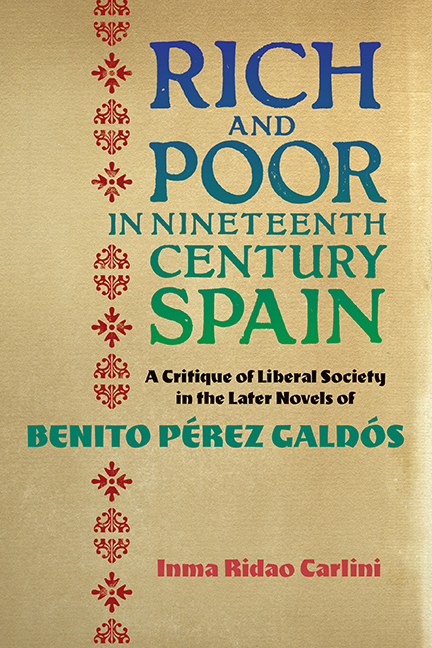 Rich and Poor in Nineteenth-Century Spain
Rich and Poor in Nineteenth-Century Spain Book contents
- Frontmatter
- Contents
- Acknowledgements
- Abbreviations
- Introduction
- 1 Changing Fortunes and the Financial World in Galdós's Lo prohibido
- 2 From Usurer to Marqués: Lending and Social Advancement in the Torquemada Novels
- 3 Revolution and the Politics of Religion in Ángel Guerra
- 4 The cuestión social in Misericordia
- Afterword
- Bibliography
- Index
4 - The cuestión social in Misericordia
Published online by Cambridge University Press: 05 July 2018
- Frontmatter
- Contents
- Acknowledgements
- Abbreviations
- Introduction
- 1 Changing Fortunes and the Financial World in Galdós's Lo prohibido
- 2 From Usurer to Marqués: Lending and Social Advancement in the Torquemada Novels
- 3 Revolution and the Politics of Religion in Ángel Guerra
- 4 The cuestión social in Misericordia
- Afterword
- Bibliography
- Index
Summary
The theme of charity has been the focus of much literary criticism on Misericordia. Many critics, among them Russell (1967), Varey (1970) and Penuel (1972), have concentrated on the religious, philosophical and psychological aspects of this theme. From their perspective, the novel's protagonist, Benina, is seen as the embodiment of charity as a Christian virtue. More recently, critics such as Gold (1997; 2001) and Fuentes Peris (2003) have brought into focus the social dimension of this novel. In particular, Fuentes Peris analyses Galdós's engagement here with bourgeois discourses on the poor, which often presented the lower levels of society as a threat to be contained and controlled. She highlights Galdós's handling of contemporary notions about the dangers of indiscriminate charity and the need to distinguish between the deserving and the undeserving poor. However, as Valis argues, Fuentes Peris's analysis of the theme of charity in Galdós relies excessively on the Foucauldian notion of charity, which reduces this complex concept to a simple mechanism of social control by the dominant bourgeois ideology (Valis 2010: 122).
It is important to consider that bourgeois discourses on discriminate and indiscriminate charity were part of a wider debate about both the causes of pauperism in modern society and the possible solutions to it. This complex debate encompassed questions of social justice as well as of social control. The subject was discussed from different ideological points of view, and it involved socio-economic, political and religious considerations. Thus it is not possible to speak of a unified bourgeois discourse on the poor. The aim of this chapter, then, is to contribute further to the understanding of Galdós's ironic and multifaceted engagement in Misericordia with this social debate at a time when traditional social attitudes towards the poor were rapidly changing. As Bauer argues, a socio-economic approach to Misericordia does not undermine the novel's ‘messages about the power of the imagination, love and generosity’. Rather, such an approach helps to embed these messages into the money narrative that runs through the novel (Bauer 1992: 241).
The Changing Face of Poverty
As the themes of poverty and charity are central to Misericordia, it is worth highlighting some aspects of the contemporary debates around these issues. The subject of poverty, its causes and its remedies, was omnipresent in the press of the time, and Galdós himself wrote articles on this topic during the 1880s and 1890s.
- Type
- Chapter
- Information
- Rich and Poor in Nineteenth-Century SpainA Critique of Liberal Society in the Later novels of Benito Pérez Galdós, pp. 145 - 194Publisher: Boydell & BrewerPrint publication year: 2018


